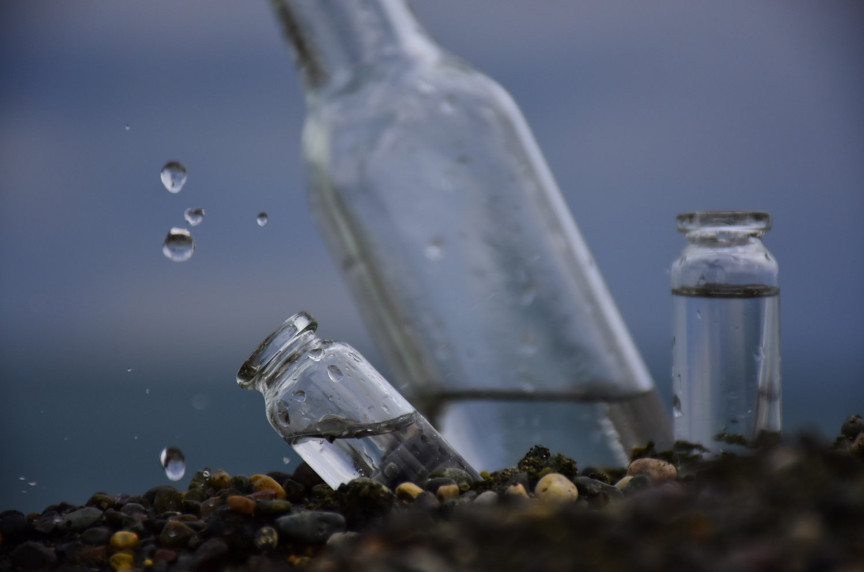口渴的时候,你的思考过程似乎相当简单:找到水,喝掉它,继续做别的去。但实际上,当你跑完步或大热天在花园里喝下一大杯清凉提神的饮料时,你的身体里发生了相当复杂的事情。
关键词:科普、译文、脑科学、喝水

Just a 10 percent shift in the salt concentration of your blood would make you very sick. To keep that from happening, the body has developed a finely tuned physiological circuit that includes information about that and a beverage's saltiness, to know when to signal thirst.
血液中的盐浓度只要变化10%就会让你生病。为了防止这种情况发生,人体已经进化出了一个精准的生理循环,包括有关盐和饮料咸味的信息,以便知道什么时候发出口渴的信号。
Nodar Chernishev / Getty Images
When you're thirsty, a swig of fresh water brings instant relief. But gulp down some salty sea water and you'll still feel parched.
当你口渴时,一大口淡水能立刻让你心满意足。但喝下一些咸咸的海水,你还是会觉得口渴。
That's because your brain is trying to keep the concentration of salt in your body within a very narrow range, says Zachary Knight, an associate professor in physiology at the University of California, San Francisco and an investigator with the Howard Hughes Medical Institute.
加州大学旧金山分校生理学副教授,霍华德休斯医学研究所的研究员扎卡里·奈特说,这是因为你的大脑正在努力将你体内盐的浓度控制在一个非常小的范围内。
'If you experience, for example, a 10 percent change, you would be very sick,' he says. 'A 20 percent change and you could die.'
“例如,如果你经历了10%的变化,你就会非常不舒服,”他说。“20%的变化,可能会导致死亡。”
Knight and a team of researchers wanted to know how the brain keeps that from happening. They report the results of their search in an article published Wednesday in the journal Nature.
奈特和一组研究人员想知道大脑是如何阻止这种情况发生的。他们在周三发表在《自然》杂志上的一篇文章中公布了他们的研究结果。
'There has to be a mechanism for the brain to track how salty the solutions that you drink are and use that to fine-tune thirst,' Knight says. 'But the mechanism was unknown.'
“大脑必须有一种机制来跟踪你喝的溶液的含盐量,并用它来调节口渴,”奈特说。“但这种机制尚不清楚。”
So Knight's team began studying brain cells known as thirst neurons.
因此奈特的团队开始研究被称为“口渴神经元”的脑细胞。
First, the team piped fresh water directly into the stomachs of some thirsty mice.
首先,该团队将淡水直接注入一些口渴的老鼠的胃中。
'Within a minute or two, infusing water into the stomach rapidly turns off these thirst neurons in the brain,' says Chris Zimmerman, a graduate student in Knight's lab who conducted the experiment. 'And not only that,' Zimmerman says, 'if we give [the mouse] access to water it doesn't drink at all.'
“在一两分钟内,通过将水注入胃中会迅速关闭大脑中的这些口渴神经元,”进行这项实验的奈特实验室的研究生克里斯·齐默尔曼说。“不仅如此,”齐默尔曼说,“如果我们让[老鼠]喝水,它根本不会去喝。”
Next the team repeated the experiment, using salty water. And this time, the thirst neurons stayed on and the animals kept searching for fresh water that would reduce the concentration of salt in their bodies.
接下来,该团队用盐水重复了这个实验。而这一次,口渴神经元仍然存在,动物们一直在寻找能够降低体内盐分浓度的淡水。
More study revealed how the system works. Cells in the gut are constantly measuring saltiness and communicating that information to thirst neurons in the brain.
更多的研究揭示了这个系统是如何工作的。肠道细胞不断地测量盐分,并将这些信息传递给大脑中的神经元。
'What's really exciting about this is not only that we've discovered this new signal from the gut to the brain, but also that we've found that it has a really specific role in controlling our behavior,' Zimmerman says.
“真正令人兴奋的是,我们不仅发现了这种从肠道到大脑的新信号,而且发现它在控制我们的行为方面具有非常特殊的作用,”齐默尔曼说。
A second study in Nature looks at a different system that also affects salt intake.
《自然》杂志上的另一项研究着眼于另一个影响盐摄入量的系统。
'We wanted to know how sodium appetite is regulated by the brain,' says Yuki Oka, an assistant professor of biology at Caltech and an author of the study.
“我们想知道大脑是如何调节钠摄入量的,”加州理工学院生物学助理教授,该研究的作者岡由纪说。
The first thing Oka's team did was use a technique called optogenetics to switch on the sodium appetite neurons.
岡由纪的团队所做的第一件事是使用一种称为光遗传学的技术来打开钠的食欲神经元。
The effect on mice was immediate. 'They pick up a piece of rock salt and then start eating it,' Oka says.
对小鼠的影响是立竿见影的。“它们拿起一块岩盐吃了起来,”岡由纪说。
When the team switched off the sodium appetite neurons, the animals stopped eating salt.
当研究小组关闭了钠的食欲神经元时,这些动物就不再吃盐了。
But how does this system work when there's no scientist flipping the switch?
但是,在没有科学家按下开关的情况下,这个系统是如何工作的呢?
Previous research has shown that part of the answer involves cells that measure salt concentrations in the bloodstream.
之前的研究表明,部分原因与测量血液中盐浓度的细胞有关。
But Oka's team figured that likely wasn't the whole answer, because animals need only a tiny amount of sodium in their diet. So they need to stop eating salt long before concentrations in blood start rising.
但岡由纪的团队认为,这可能不是全部的答案,因为动物在饮食中只需要少量的钠。因此,它们需要在血液中的盐浓度开始上升之前就停止盐的摄入。
The scientists thought there must be a second 'off switch' somewhere — one that could be flipped sooner.
科学家们认为,一定有第二个“关闭开关”在某个地方 - 这个开关可以更快地被打开。
They found it in the animals' taste buds.
他们在动物的味蕾中发现了这种物质。
'When you put sodium-salt on top of the tongue, and then, when you taste it, that's sufficient to suppress sodium appetite neurons,' Oka says. That's how we know to stop eating salt before we've consumed a harmful dose.
“当你把钠盐放在舌尖,当你尝它的时候,就足以抑制钠的食欲神经元了,”岡由纪说。这就是我们如何在摄入有害剂量之前停止食用盐的方法。
And sports drinks, the UCSF scientists explain, contain exactly the same concentration of sodium found in our bodies; that's how the drinks replace sodium without triggering the brain's 'stop eating salt' response.
加州大学旧金山分校的科学家们解释说,运动饮料的钠含量与我们体内的钠含量完全相同;这就是这些饮料如何在不触发大脑“停止吃盐”反应的情况下替代了钠。
(责任编辑:周姚)

